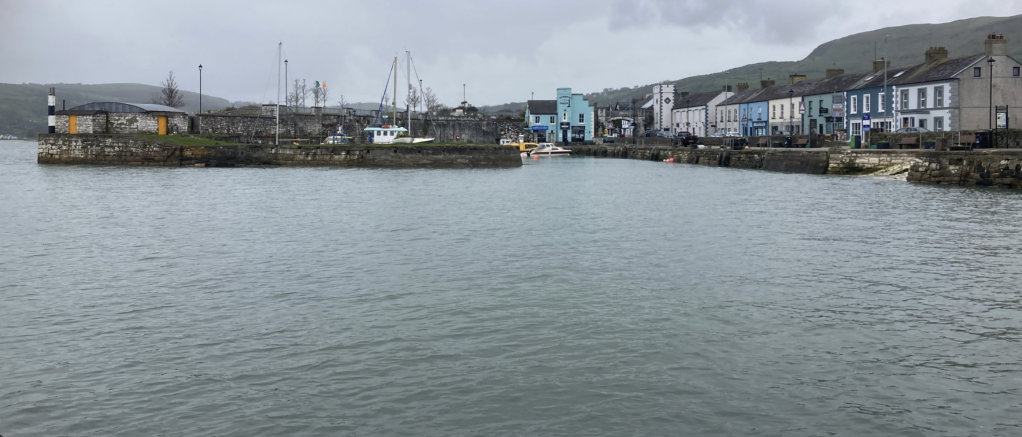
Horses swam in the harbour at Carnlough, and it was raining. A lorry had pulled up on the quay and the animals were being walked on long leads down the slipway to the water. They didn’t want to go in, but a touch from a whip steered them to the flatcalm sea where the rain fell in steady, stippled pecks to the water.
Horses sink like we do, and only their heads and the mounds of their rumps were visible above the surface when their footing fell away. They huffed and snorted, and it was hard work for them as each one swam in circuits for fifteen minutes. As they circled around and came back towards land, the whip was used to hold them in the water. It was their natural urge to get out, but when the knotted string was touched nearby, they turned and laboured back into deeper water again. Welts of kelp slopped against the limestone walls of the harbour, and while one man walked beside the horses, a second lay on the downfallen door of the lorry and ate a Yorkie.
It’s fifteen miles from Antrim to Kintyre, but there was no sign of Scotland that day. There was only a grey cast which robbed the eider ducks of their contrast and made snakes of the cormorants. The sea had brought stumps of alder into the quay, and they might have come from over the water – but there was no way to be sure, and isn’t it the same place anyway? A man came and told me that they were big pieces of wood, and I agreed that it was enough to know that only. Then he walked away for a short distance and came back to explain that one of the boats dry-docked on the harbour wall was the Flora of Belfast, built to carry a local man across the sea to find his lost love. He made her himself using timber from the hills, and there couldn’t be a more-local boat. She was only registered to Belfast because a globetrotting vessel is best aligned with a fine pedigree of shipbuilders, and if anything went wrong on the final sweep to Boston, it would help the authorities to read a familiar name in the wreckage.
That was in 1911, in anticipation of a trip that was never made. America was abandoned, and the Flora spent a century sailing up and down the Antrim coast on a variety of missions and undertakings. Too small to carry limestone over to Scotland or return the journey with coal or barrels for the boys at Bushmills, she was a jobbing boat with no clear specialisation. And now that she’s been deregistered and stripped of all her fittings, she’s just an eyeless hull with the name and number blotted out and the nails all rusting through.
The Flora belongs to the great grandson of the man who made her, but it’s been four years since she was pulled out of the sea by two tractors and laid to rest on the land. The owner wants to break her up and burn the wood so it can be thrown as ash to the sea. Because she was a lucky boat, and when the natural span of a vessel’s life has passed, it surely makes sense to return its luck to the sea. But the council was unhappy with the idea of burning the timbers, and all the many years of tars and bitumastic paints would surely blacken the laundry as it hung in the neighbouring gardens. No – she wasn’t to be burnt on grounds of environmental health, so there she’s lain ever since – a lifetime of peaceful productivity, and a bone of contention in death. All of this came pouring forth without query or provocation from a man with his dog in the rain, and the horses casting vees behind them in the green and slovenly sea.
When he paused at last for a moment’s thought, I asked the man if it was a Catholic thing – this burning and returning of luck to the world. Because I am new to these things, and it sometimes feels like the Catholic church is better at preserving old ingenuities. But he said it’s Viking, and sure they burn boats on Orkney and all up the east coast of Scotland? To him, Viking to Protestant was an easy leap, and perhaps he thought my question was impertinent. His family came to Ireland as Protestant Scots in 1610, and they’d tried both sides of the divide ever since. In his current person, that old bloodline was in a Catholic phase, so he could speak with authority when he told me with a sigh that “Protestants are the worst for believing things”.
A horse came out of the water and into the warming rain. It shook and then began to shiver, so the man on the lorry’s trailer board stood up and threw a rug across its back. I went to see, and he explained that the animal had been carrying an injury, and it was safer and stronger to exercise an injured horse by swimming more than running. The horse huffed, and surely it couldn’t hurt to steep a beast for luck in the soup of all those cindered boats.
Leave a comment